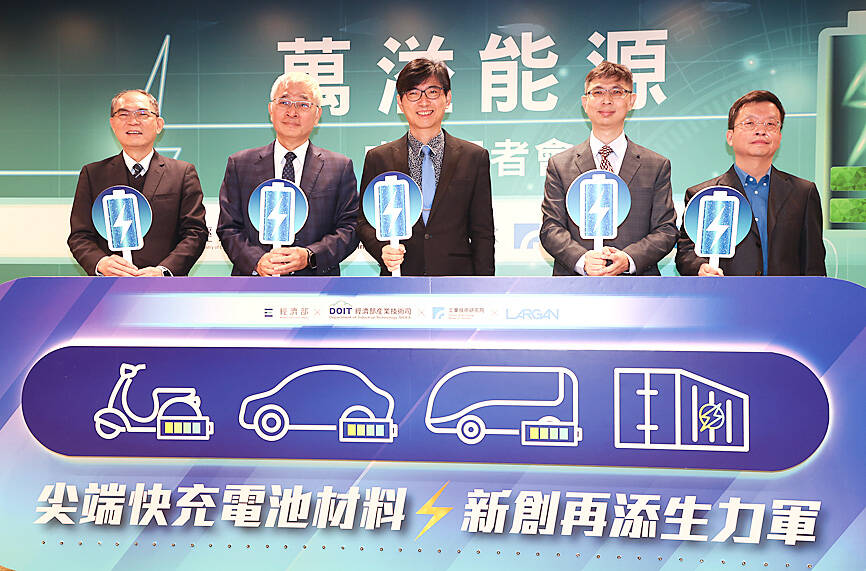Largan Precision Co (大立光) has formed a joint venture with the Industrial Technology Research Institute (ITRI, 工研院) to produce fast-charging, long-life lithium-ion batteries for electric vehicles, mobile electronics and electric storage units, the camera lens supplier for Apple Inc’s iPhones said yesterday.
Largan Energy Materials Co (萬溢能源材料), established in January, is developing high-energy, fast-charging, long-life lithium-ion batteries using titanium niobium oxide (TNO) anodes, it said.
TNO-based batteries can be fully charged in five minutes and have a lifespan of 20 years, a major advantage over the two to four hours of charging time needed for conventional graphite-anode-based batteries, Largan said in a joint statement.

Photo: CNA
The TNO-based batteries are also considered to be more suitable energy solutions for electric buses, power storage devices, hybrid vehicles, stackers and drones, the statement said.
The value of the global lithium-ion battery market is forecast to climb to US$450 billion in 2030, Largan said, citing McKinsey & Co’s research.
Largan Precision owns about 20 percent of Largan Energy Materials, with an investment of NT$450 million (US$14.33 million), according to registration information on the Ministry of Economic Affairs’ Web site.
The government-funded ITRI holds the remaining 80 percent stake in the venture.
“The collaboration with ITRI shows the company’s confidence in lithium-ion batteries using TNO anodes. The company also has high confidence about applying the batteries to different applications,” Largan president Huang You-chih (黃有執) said.
Largan Energy Materials plans to build a pilot-run production line at Largan Precision’s headquarters in Taichung this year, with an initial annual capacity of 24 tonnes.
By 2026, its aims to boost capacity to 600 tonnes, Huang said.
Lithium-ion batteries are essential for mobile electronics, electric vehicles and power storage systems, and the world’s major battery makers and researchers have been striving to develop new battery materials amid growing demand for safe batteries with a long lifespan, ITRI executive vice president Chang Pei-zen (張培仁) said.
The Department of Industrial Technology has invested NT$1 billion over the past five years in scientific research on developing fast-charging, solid-state lithium-ion batteries and low-carbon-emission process technologies, the ministry said.

In Italy’s storied gold-making hubs, jewelers are reworking their designs to trim gold content as they race to blunt the effect of record prices and appeal to shoppers watching their budgets. Gold prices hit a record high on Thursday, surging near US$5,600 an ounce, more than double a year ago as geopolitical concerns and jitters over trade pushed investors toward the safe-haven asset. The rally is putting undue pressure on small artisans as they face mounting demands from customers, including international brands, to produce cheaper items, from signature pieces to wedding rings, according to interviews with four independent jewelers in Italy’s main

Macronix International Co (旺宏), the world’s biggest NOR flash memory supplier, yesterday said it would spend NT$22 billion (US$699.1 million) on capacity expansion this year to increase its production of mid-to-low-density memory chips as the world’s major memorychip suppliers are phasing out the market. The company said its planned capital expenditures are about 11 times higher than the NT$1.8 billion it spent on new facilities and equipment last year. A majority of this year’s outlay would be allocated to step up capacity of multi-level cell (MLC) NAND flash memory chips, which are used in embedded multimedia cards (eMMC), a managed

In the wake of strong global demand for AI applications, Taiwan’s export-oriented economy accelerated with the composite index of economic indicators flashing the first “red” light in December for one year, indicating the economy is in booming mode, the National Development Council (NDC) said yesterday. Moreover, the index of leading indicators, which gauges the potential state of the economy over the next six months, also moved higher in December amid growing optimism over the outlook, the NDC said. In December, the index of economic indicators rose one point from a month earlier to 38, at the lower end of the “red” light.

The global server market is expected to grow 12.8 percent annually this year, with artificial intelligence (AI) servers projected to account for 16.5 percent, driven by continued investment in AI infrastructure by major cloud service providers (CSPs), market researcher TrendForce Corp (集邦科技) said yesterday. Global AI server shipments this year are expected to increase 28 percent year-on-year to more than 2.7 million units, driven by sustained demand from CSPs and government sovereign cloud projects, TrendForce analyst Frank Kung (龔明德) told the Taipei Times. Demand for GPU-based AI servers, including Nvidia Corp’s GB and Vera Rubin rack systems, is expected to remain high,